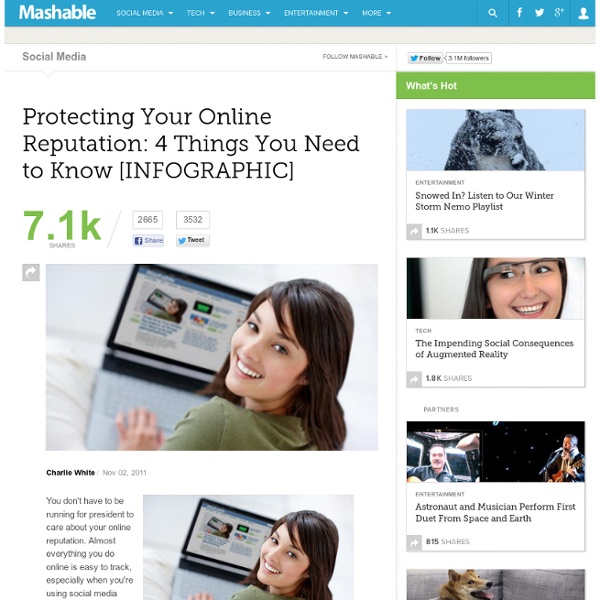Online Reputation Infographic
You don't have to be running for president to care about your online reputation. Almost everything you do online is easy to track, especially when you're using social media sites. This infographic shows you how to manage your "e-reputation," perhaps saving you some embarrassment, or even your career. Gathered by digital marketing firm KBSD, it's a treasure trove of tips, techniques and information about what companies and individuals are looking for inside your personal profiles and social information, and what you can do to show off your best side to those who might want to find out unflattering things about you. So now that you've grown up (you have grown up, haven't you?) Infographic courtesy KBSD, photo courtesy iStockphoto/Yuri Arcurs
Related: Digital Citizenship
THINK Poster
Marsali Hancock: Digital Citizenship for Today's Teens
HuffPost High School and iKeepCurrent will explore digital citizenship: what it means to be an ethical, responsible and resilient digital citizen. Our partnership will provide a unique opportunity to include the youth voice often left silent in the online safety, security and ethics discussion. This is what we know: the way students interact with each other online profoundly affects how they perceive themselves and engage with others offline. The reality is that our young people meet and bond emotionally through their digital devices. Every day we learn of digital dramas and dilemmas that are rocking schools, regions or the entire nation. That's why we've created the iKeepCurrent Generation Safe News Feed. And because adults don't solely shape what's happening now, we've got turn to our young technocrats who live these stories every day and have something to teach us in return. It's all about positioning our teens for success in this new connected reality that we live in.
Sightsmap
THINK Poster
iKeepCurrent
Théorie des intelligences multiples
La théorie des intelligences multiples suggère qu'il existe plusieurs types d'intelligence chez l'enfant d'âge scolaire et aussi, par extension, chez l'Homme. Cette théorie fut pour la première fois proposée par Howard Gardner en 1983. L'origine de la théorie Lorsque Howard Gardner publia son livre Frames of Mind: the Theory of Multiple Intelligence en 1983, il introduisit une nouvelle façon de comprendre l'intelligence des enfants en échec scolaire aux États-Unis. Une traduction française de ce livre a été publiée en 1997 sous le titre Les formes de l'intelligence (Odile Jacob). Il y présentait sept catégories d'intelligence. Intelligences multiples et polymathes Selon certains auteurs, l'existence de polymathes invalide cette théorie1. L'intelligence sociale Les diverses catégories d'intelligence pour Howard Gardner L’intelligence logico-mathématique L’intelligence spatiale L'intelligence interpersonnelle L’intelligence corporelle-kinesthésique L'intelligence verbo-linguistique Bibliographie
Five-Minute Films
"Digital citizenship" is an umbrella term that covers a whole host of important issues. Broadly, it's the guidelines for responsible, appropriate behavior when one is using technology. But specifically, it can cover anything from "netiquette" to cyberbullying; technology access and the digital divide; online safety and privacy; copyright, plagiarism, and digital law, and more. In fact, some programs that teach digital citizenship have outlined no less than nine elements that intersect to inform a well-equipped digital citizen. It's an overwhelming array of skills to be taught and topics to explore. But while there is much talk about the importance of teaching digital citizenship in this information society, not many are sure what that really looks like. Video Playlist: Teaching Digital Citizenship Watch the player below to see the whole playlist, or view it on YouTube. What is Digital Citizenship? More Resources for Learning About Digital Citizenship
Online safety & civility
presenta la segunda versión del Mapa de las Redes Sociales
Por Chiqui Esteban, @chiquiesteban En el mundo cada vez hay más redes sociales. Con más usuarios. Y con una mayor actividad. Esta segunda versión de este mapa tiene el mismo objetivo que la primera: mostrar de un vistazo las principales redes sociales de las que se hace uso en Iberoamérica. Se han dividido las marcas según el objetivo de cada red, dando un color a cada tipo para diferenciarlas: generales, vídeo, temáticas, negocios… Como se podía intuir, las redes generalistas son mayoría, destacando de manera notoria algunas que ya forman parte del lenguaje de nuestro día a día: Facebook y Twitter. El mapa destaca especialmente a las marcas españolas, un grupo que sigue con Tuenti (13 millones) como líder destacado, con más de diez veces más usuarios que el segundo en la clasificación, Forocoches (578.000). Embeber: Este mapa puede embeberse copiando el código que aparece al pinchar en la esquina superior derecha del gráfico:
Junior Poster
Related:



